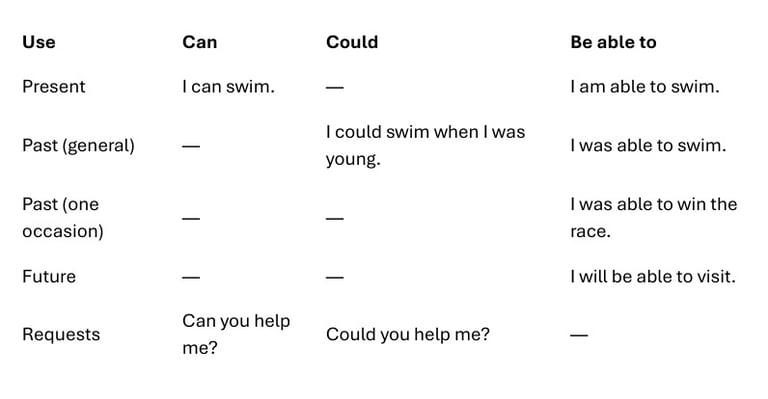Talking About What We Can Do (Yesterday, Today, or Tomorrow!)
Imagine you say:
“I can swim.”
“I could swim when I was five.”
“I hope I’ll be able to swim next summer.”
These sentences all talk about ability — what you can do, what you could do, and what you might do in the future.
Understanding when to use “can,” “could,” and “be able to” makes your English sound clear, correct, and natural — so you can talk easily about your skills, possibilities, and experiences.
Let’s explore them together so you know exactly which one to use in the past, present, or future! 🌱✨
✏️ Detailed Explanation: Can, Could, and Be able to
All three talk about ability — but they have different uses depending on time and meaning.
✅ 1️⃣ Can
Meaning: Ability or possibility in the present or general truth
Also used to ask for or give permission.
Examples:
I can speak English. (ability now)
Can I use your phone? (asking permission)
✔ Structure:
Subject + can + base verb
I can play the guitar.
✅ 2️⃣ Could
Meaning:
Past ability (what you were able to do in the past, usually in general)
Polite requests
Possibility (but less certain)
Examples:
I could swim when I was five. (past ability)
Could you help me? (polite request)
It could rain later. (possibility)
✔ Structure:
Subject + could + base verb
She could read at age four.
✅ 3️⃣ Be able to
Meaning: Ability in different tenses (past, present, future, perfect, etc.)
Examples:
I am able to help you now. (present)
I was able to finish on time. (past – especially when talking about a single successful event)
I will be able to visit next week. (future)
She has been able to find a job. (present perfect)
✔ Structure changes with tense:
Tense
Present
am / is / are able to
Past
was / were able to
Future
will be able to
🌟 Quick Comparison Table:


✨ Tips to remember:
✔ Use can for now or always
✔ Use could for past ability, polite requests, or possibility
✔ Use be able to for more formal or flexible tense use, especially when can/could isn’t possible (e.g., future: will be able to)
🎯 Why learn them?
Because they help you:
✅ Express what you can do now, what you could do before, and what you might do in the future
✅ Sound polite when making requests
✅ Speak about ability naturally in every tense
🌟 Conclusion:
Use:
✅ Can → ability now & permission
✅ Could → ability in the past & polite requests
✅ Be able to → for flexibility in any tense (past, present, future)
Mastering these makes your English more precise, polite, and fluent! 🌍✨
📝 10 Multiple-Choice Quiz Questions
